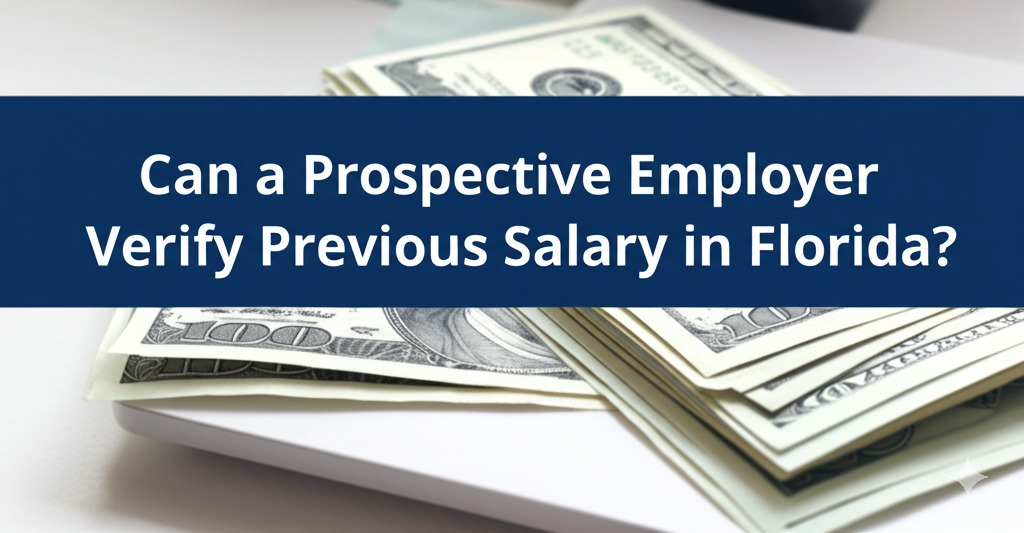
When you’re applying for a new job, one question that might come up is: Can a prospective employer verify your previous salary in Florida? It’s a fair concern, especially if you’re hoping for a significant pay increase or simply want to keep your financial history private.
Understanding your rights and what employers are legally allowed to ask or check is essential for navigating the hiring process with confidence. Let’s explore what Florida law says, how employers typically approach salary verification, and what job seekers can do to prepare.
Is It Legal to Ask About Salary History in Florida?
Unlike some other states, Florida currently has no statewide law prohibiting employers from asking about salary history. This means:
- Employers can legally ask candidates about their previous salary.
- Job seekers are not required to disclose their salary history unless they choose to.
- There is no ban on using salary history to determine a job offer or compensation.
Why Is This a Concern?
The practice of asking for previous salary can sometimes perpetuate wage inequality—especially for women and minorities. That’s why several states and cities have enacted “salary history bans” to prevent this. But in Florida, such protections don’t exist at the state level.
Can Employers Verify Previous Salary Information?
While employers in Florida can ask about your salary history, the bigger question is: Can they verify it?
Here’s how it typically works:
1. Direct Verification Through Previous Employers
Most employers do not disclose salary information due to company policies or privacy concerns. Even if a prospective employer contacts your former job, they’ll likely receive only:
- Job title
- Dates of employment
- Possibly job responsibilities
Salary details are often kept confidential, unless you’ve given explicit consent.
2. Verification Through Background Checks
Some background check services can reveal salary information, but only under specific conditions:
- You must give written authorization.
- The data must be available through publicly accessible or verified records (rare).
3. Verification via Tax Documents (Rare)
In highly sensitive positions, an employer might ask for pay stubs, W-2 forms, or tax returns to confirm salary history—but again, only with your consent.
Bottom line: Employers can attempt to verify salary, but access is limited and usually requires your permission.
What Are Your Rights as a Job Seeker in Florida?
Even though Florida allows salary questions, you have the right to protect your privacy. Here’s what you can do:
You Can Decline to Disclose Salary History
You’re not obligated to answer salary history questions. A polite way to redirect the conversation is:
“I prefer to focus on the value I bring to this role and what’s appropriate for the responsibilities outlined.”
You Can Ask About Salary Ranges
Turn the tables by asking the employer:
- “What is the salary range budgeted for this role?”
- “Can you share how compensation is determined within your organization?”
You Can Negotiate Based on Market Rates
Instead of leaning on your past salary, base your negotiations on:
- Industry standards
- Your experience and skill set
- The responsibilities of the role
Websites like Glassdoor, Payscale, and the Bureau of Labor Statistics can help you benchmark a fair salary.
City and County Salary History Bans in Florida
Although Florida has no state law, some local governments have implemented salary history bans—but only for public-sector jobs. Examples include:
- Miami-Dade County: Bans asking about salary history for county positions.
- Gainesville: Similar restrictions apply for city jobs.
These bans do not extend to private employers.
Tips for Navigating Salary Questions During the Hiring Process
To help you stay confident and in control, follow these best practices:
✅ Be Prepared
Have a solid understanding of your desired salary range and what the role is worth.
✅ Practice Your Responses
Prepare respectful answers to salary history questions. You can say:
“I’d rather discuss what a competitive salary for this role looks like.”
✅ Focus on Value, Not History
Shift the conversation to what you bring to the table:
- Unique skills
- Industry certifications
- Leadership experience
- Past achievements
✅ Get Everything in Writing
If you agree to disclose salary or provide documentation, make sure it’s handled through official channels and clearly documented.
Conclusion: Know Your Rights and Take Charge of the Conversation
So, can a prospective employer verify previous salary in Florida? Technically, yes—but it’s complicated, and only with your consent in most cases. While they can ask, verifying that information isn’t always straightforward or even possible.
You have the power to shape the narrative of your job search. By focusing on your value rather than your past, and by knowing your rights, you can steer the salary conversation in a way that benefits you.

Andre Cuevas provides career insights, job search strategies, and professional advice to help individuals navigate the job market and achieve their career goals.






